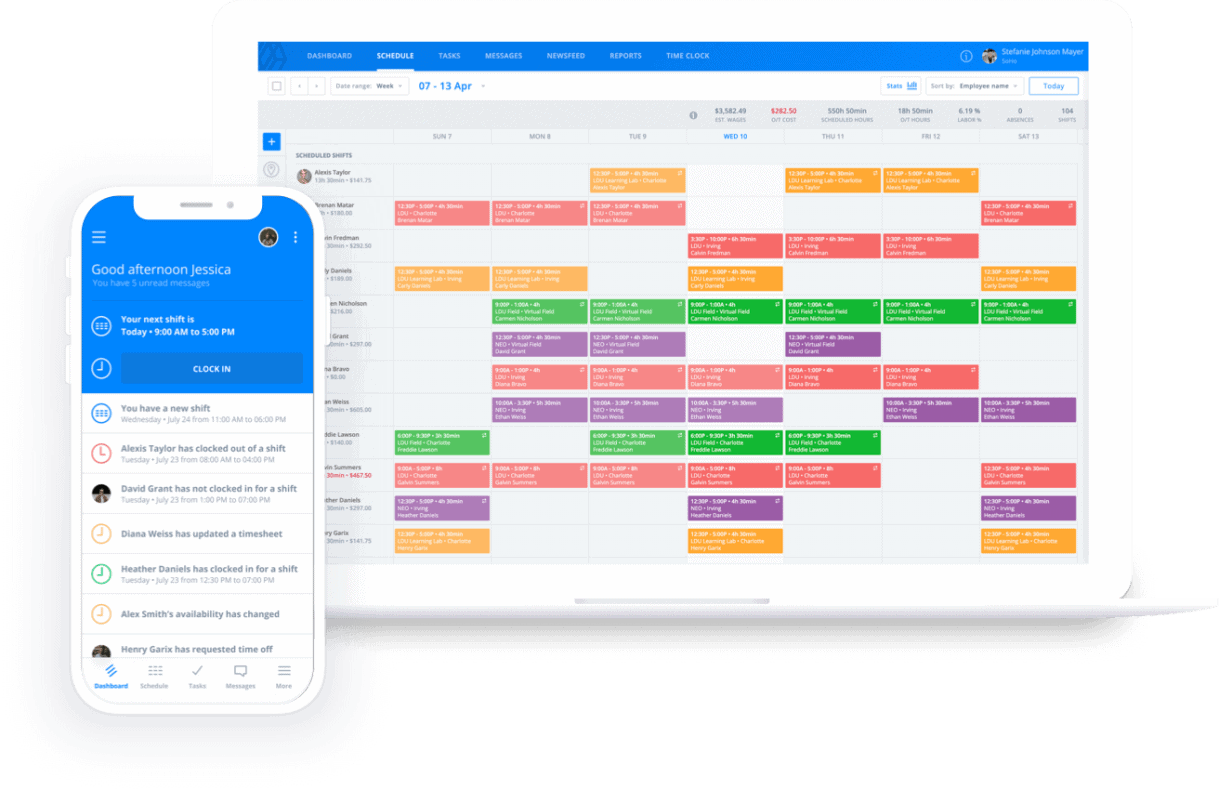The 37 Best Restaurant Interview Questions
Discover 37 restaurant interview questions that help you avoid the canned answe...

Interviewing for a managerial job is a stressful time even for the most experienced workers. A manager’s responsibilities are significantly different from other positions, so you may be unsure where the interview will go.
Even conducting the interview for a new manager is stressful for the person on the other side of the desk. What should you ask to get a good sense of the candidate’s skills? What should you ask to determine if they’ll fit into your company culture?
Whether you’re interviewing for the job or you’re the one conducting the interview, you can reduce the stress and anxiety of the process by reviewing common interview questions for managers.
The experts at Sling have created a list of the top interview questions for managers so that you’ll be cool and calm in any situation.
In this section, we’ll direct our attention at those being interviewed for a managerial job. Candidates can use these top interview questions for managers to practice their answers and prepare for the interview ahead.
In the next section, we’ll direct our attention to those conducting the interview (but candidates can learn a lot, too). There, we’ll give you tips on how to run things and draw your attention to red flags to watch out for.

Don’t try to turn this around to highlight one of your strengths (“I’m just too driven”). Be honest. No one’s perfect, and interviewers know that. They also know that recognizing your weaknesses means there’s an opportunity to improve.
So pick something you feel you can work on—trust, demand for perfection, need for control—and describe how it has affected your work in the past. Then explain how you’d like to fix it.
Now is your chance to brag a little, but don’t be disingenuous or resort to hyperbole. Describe your biggest management strength and explain how it benefits your team and helps them get the job done.
While you’re doing this, always try to remember that, ultimately, this isn’t about you. It’s about how your strength integrates with the strengths of others to form a cohesive unit. Find a way to explain your strengths in that light.

This can be a tricky question to answer because, chances are, the way you manage your team is a mix of different styles. Instead of trying to settle on one specific named method, explain how you would approach, conduct, and complete a new project.
Doing so will give the interviewer a sense of your style without you having to commit to one or the other. Plus, it gives the interviewer the opportunity to ask “What if…” questions. These questions allow you to show how you would adapt when your team faces a problem.
Every manager has different methods. You’re no exception. Your go-to method for dealing with an underperforming colleague may be “tough love.” But this doesn’t work for all employees.
Even if your first instinct is to be brutally honest with a team member, explain to the interviewer that you would base your communication on what works best for each particular employee. That way, you can motivate them positively rather than negatively.
Don’t settle for a one-word answer, like money or prestige. And don’t make this question only about yourself. Instead, define success from the perspective of a team.
What small successes do you strive for when managing a project (e.g., reaching interim goals, resolving conflicts)? What large successes do you strive for when managing a project (e.g., finishing on time, staying under budget)?
It’s those project specifics (both small and large) that shape your definition of success. And your definition will ultimately shape how your team gauges success.

Do you do all the work yourself? Do you bring in trusted team members to assist? The way you prepare for an important meeting says a lot about the way you manage your work and your team. It also exemplifies how well you might assimilate into the existing team dynamic.
The best answer to this question is to describe your process in as much detail as possible (without taking up too much time, of course). This will help the interviewer get a complete picture of how you operate as a manager.
Rather than opting for a single answer to this question, tell a story instead. Use it as an opportunity to relate an instance when you successfully mitigated team stress.
You shouldn’t assume that the interviewer will understand your methods, so be sure to highlight exactly what you did to manage stress within the context of the story. It’s also essential to communicate your willingness to investigate and incorporate other stress-management strategies.

Do you dole out responsibilities in alphabetical order? Of course not. That’s a recipe for disaster. You delegate work only after giving everything plenty of thought. You may even gather the team around the proverbial campfire to get their input on exactly what needs to be done.
However you start the process, chances are you delegate work based on the aptitude and experience that each team member brings to the group. It’s those details that you want to explain to the interviewer.
It’s vital to understand that stress and conflict are two very different things. It’s also important to communicate this difference to the interviewer should the question arise.
Most conflict resolution involves sitting down with each party separately to hear both sides of the story. Once you understand the issue, you can work together to come up with solutions to get the matter resolved. Explain your methods for making this process go smoothly.
Whatever your method for letting someone go, it’s essential that you keep three key points in mind:
Letting someone go is never easy, and you should never make light of this responsibility in an interview. Instead, describe how you did (or would do) what had to be done in the most professional way possible.

Use this question to relate a time when you successfully motivated your team to surpass their goals. If you’ve never managed a team before, describe an instance when you were motivated by your manager. In the process, express how you would like to emulate that method.
Keep in mind that, like stress management and conflict resolution, motivation isn’t a one-size-fits-all activity. It’s crucial that you get to know all your team members to find out what motivates them.
Managers are not above the “grunt work” that makes the business run. Sometimes, you’ll have to roll up your sleeves and lead by example.
This question is an opportunity to highlight your willingness to work and help the team when they need it.
Try to avoid making yourself look like the savior. Instead, relate how you integrated with your direct reports and how you contributed to the overall success of your team.
All managers have to make tough decisions from time to time — whether it’s letting someone go, disciplining a subordinate, or dealing with a difficult customer or client.
Answer this question by relating a time when you put the betterment of your business or your team above and made a decision that went against your personal feelings.
Doing so shows that you’re willing to put the company above yourself no matter what comes your way.

It doesn’t matter how long you’ve worked in a business — whether as a team member or a manager — you’re going to have a conflict with a subordinate or colleague at some point.
Everyone knows it happens, so don’t try to avoid it. Instead, acknowledge it and use it as a learning experience to improve your management style.
If you’re asked this question in an interview, don’t be afraid to be honest and relate how you did it wrong the first time through, learned from your mistake, and dealt with the conflict better the next time around.
No two projects are exactly the same, no matter how much you plan and prepare. Each will present its own unique challenges and obstacles.
Answer this question with a description of those challenges and then relate how you dealt with those speed bumps and guided your team to success. Doing so shows the interviewee how you hold up under stress in the face of adversity.

As we mentioned at the beginning of this article, the next two sections will focus on those conducting the interview, how they can best prepare the interview questions for managers, and red flags to watch out for during the discussion.
Interviewees can also learn a lot about the interview process from these sections, which will help them be as prepared as possible for the discussion to come.
When you ask candidates to describe their previous work experience in one or more interview questions for managers, you gain a better understanding of their management style.
That insight can help you decide whether the way they work, delegate, and interact fits the needs of your team and your business.
Stability is the foundation of a successful team, so it’s best to view each managerial candidate as a long-term partner.
To that effect, then, during the interview, ask yourself:
If the position for which you’re hiring involves hiring others, take a few minutes to find out how familiar the candidate is with recruiting and training.
This will, then, give your HR Department a better idea of what they need to provide the new hire to prepare them for their managerial role in your company.
Candidates with creative and innovative ideas can bring a fresh perspective to your business and help your team — and your company as a whole — perform better.
Keep an eye out for these high-performing candidates and move them to the top of the list when you find them.
Many interviewers tend to dismiss or mark down a candidate who lacks experience in the sector in which the business operates. But, that’s not always a negative.
If the candidate is willing to learn new things and has a basic understanding of terms and procedures, their other good qualities may trump their lack of experience and make them a perfect candidate for the job.

There are many ways to put the blame on someone or something else. It could be a team member who just wasn’t up to snuff. Or it could be a lack of resources that prevented the candidate from reaching their goals.
Regardless, a candidate who makes excuses in any of the interview questions for managers is telling you that they’d rather not be held accountable for their actions.
Lack of interest at the managerial level can spread to the rest of the team where it affects the focus, inspiration, and productivity of your employees.
To avoid this negative trickle-down effect, opt for candidates who are passionate about their role in your business and who are interested in learning about how your company works.
Answers that indicate inflexibility are often a manifestation of poor collaboration skills, potential bossiness, and even arrogance in some cases.
Look, instead, for candidates who are open to new ideas, who are willing to change if a better way is available, and who want to promote team spirit by being flexible in all they do.
We all want to make a good first impression, and manager candidates are no exception.
They’ll format their answers to put themselves in a good light, but if they give an unrealistic answer to a question like, “Can you describe a time you had a conflict with a subordinate?”, they may not have the experience necessary to deal with and manage difficult situations.
Duties will differ from company to company and position to position, but all managers will have to deal with delegating the workload and giving negative performance reviews from time to time.
If a candidate’s answers indicate that they’re uncomfortable with these, and other, regular duties, they might not be suited for the position.

For an interviewee, there’s no way for you to know every question an interviewer may ask. Don’t even try to memorize them all. Instead, think about common responsibilities that managers face—like hiring, firing, motivation, and team-building. Then prepare answers that cover those major topics. That way, you can be ready for anything the interviewer throws your way.
For an interviewer, the same advice applies: think about common responsibilities that your managers will face and create questions that cover those major topics.
Regardless of which side of the desk you’re on, preparation is key. Schedule plenty of time to get all your ducks in a row. Sling can help.
Sling is packed full of intuitive and well-organized scheduling tools that make it simple to create a clear, easy-to-read schedule for you and your employees. And the fact that Sling is cloud-based (instead of only on one computer or tablet) means that storage, distribution, and access are easier than ever.
You can even control who can view the schedule and who can make changes with just the touch of a button.
Sling’s onboard A.I. even incorporates your employee’s time-off requests and gives you reminders and suggestions about unavailability, double-bookings, and more. These features — and many more — make scheduling, organizing, and communicating with your employees a breeze.
For more free resources to help you manage your business better, organize and schedule your team, and track and calculate labor costs, visit GetSling.com today.
See Here For Last Updated Dates: Link
This content is for informational purposes and is not intended as legal, tax, HR, or any other professional advice. Please contact an attorney or other professional for specific advice.
Schedule faster, communicate better, get things done.